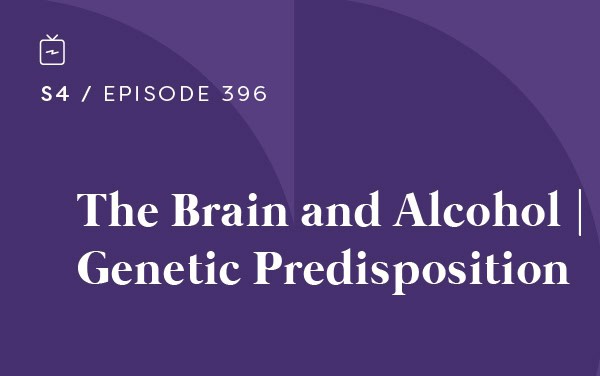
by Kris Oyen | Sep 19, 2022 | Podcast
Podcast: Play in new window | Download
Subscribe to the Recovery Elevator Podcast Apple Podcasts | | More
Episode 396 – The Brain and Alcohol – Genetic Predisposition
Today we have Rene. He is 33, from California, and took his last drink January 18, 2022.
Register for RE’s AF Photo Class: https://www.recoveryelevator.com/afphoto/
SoberLink: https://www.soberlink.com/recovery-elevator
Highlights from Paul
Alcohol has many biochemical and neurochemical effects on the brain. There are dramatic changes in the neurons that control the release of serotonin when we consume alcohol. Serotonin is the feel-good chemical and 80% of it is created in the gut. When we mix alcohol and serotonin it gets converted into acetaldehyde. This acetaldehyde acts as a toxin.
Alcohol changes the relationship between the hypothalamus, the pituitary gland, and the adrenals. The adrenals release chemicals called epinephrine and cortisol, which are involved in the longer-term stress response.
People who consistently drink are more stressed out at baseline. They have more cortisol released form their adrenal glands even when they are not drinking. Consequently, they feel more stressed and more anxiety when they are not drinking. Many scientists agree that stress is the number one contributor to disease.
When we overload the brain with alcohol, it’s almost too much to process and the activity of neurons in the hippocampus, which is involved with memory formation, are strained and then they completely shut off – that is a blackout. You can still be functioning, some high functioning, but the memory forming part of your brain, the hippocampus, clocks out.
Many believe that alcoholism is hereditary. Recent studies, including one of twins conducted by Dr. Gabor Mate indicate genetics may not be as much of a contributor as we once thought. Epigenetics indicate that environment influences gene expression and gene mutations. Science is beginning to accept that environmental factors cause or influence addictions. The ten-fold increase in alcoholism supports that theory.
Dr. Andrew Huberman’s podcast provides much more detail on the science behind many of these theories. Take a listen if you would like to learn more:
https://open.spotify.com/episode/2ebY3WNejLNbK47emgjd1E?si=bf71f9f038bc4826
Better Help: www.betterhelp.com/elevator – 10% off your first month. #sponsored
[14:37] Rene has been sober for over six months. He is 34 and a single Dad He is an entrepreneur and enjoys going to the gym, exploring the outdoors, hiking and the beach.
Rene is first generation American, and his family is very supportive. He grew up around drinking, it was normalized.
He got drunk once during his senior year of high school. He didn’t drink again until after he broke up with his first girlfriend years later. Drinking became a reward, then it became a daily habit. Working in the restaurant industry, drinking was expected. He was fired once for drinking.
It didn’t occur to Rene that drinking was a problem. He began counseling and the counselor recommended AA. Rene found it easy to see the similarities; he felt like he found his people. He was planning to join the military when he learned he was about to become a father. Eventually, he won sole custody of his daughter which dashed his hopes of joining the military. The combination of issues sent him back to drinking. He controlled his drinking for over a year, and it worked until it didn’t.
Rene went back to AA and got a sponsor and a fitness coach. Consistency helps him maintain his sobriety. He is feeling mentally and physically strong.
[57:35] Kris’s Summary
Seasonal shifts can put you on edge. Share your experience: kris@recoveryelevator.com.
Upcoming events, retreats, and courses:
- You can find more information about our events
Resources
Connect with Cafe RE – Use the promo code OPPORTUNITY to waive the set-up fee.
Recovery Elevator YouTube – Subscribe here!
Sobriety Tracker iTunes
Recovery Elevator-
We took the elevator down. We need to take the stairs back up.
I love you guys.
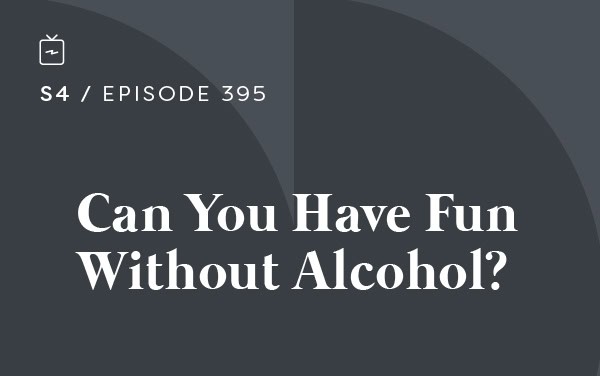
by Kris Oyen | Sep 12, 2022 | Podcast
Podcast: Play in new window | Download
Subscribe to the Recovery Elevator Podcast Apple Podcasts | | More
Episode 395 – Can you have fun without alcohol?
Today we have Jim. He is 50, from New York, and has been sober since June 19, 2022.
Curious Elixirs: https://curiouselixirs.com/
Highlights from Paul
Paul and our listeners would like to hear from prior podcast guests. Please send us a note (approximately 200 words) to let us know how you are doing. We would love an update on your sobriety journey. Email: info@recoveryelevator.com
Yes! You can have fun without alcohol. Paul just finished hosting the Bozeman retreat, and it was FUN. One of the highlights was an ecstatic dance party. Imagine 60ish sober people dancing on a basketball court in the afternoon. There was also a silent dance party on the last night. Paul loved watching and participating in pure joy and fun.
Sober fun is a learned skill, but it’s worth it. You learn to have fun without an external substance. Life is like a movie. Consider yourself the director. You can guide or nudge it any way you want. Leave room for other actors in your life and let them act their way. It makes the experience rich. If you are not having fun, check your inner narrative. At times we let external rules guide us when we have fun. Forget those rules and have fun now.
Stay tuned to the end for a poem written by one of our listeners, and today’s outro music was written and performed by Michael P, a member of Café RE.
Better Help: www.betterhelp.com/elevator – 10% off your first month. #sponsored
[10:02] Jim has been sober for two weeks. He had almost two years and drank, and now he is back on track. He’s had 699 sober days in the last 700. Jim is married with two kids and loves reading on his front porch.
Jim attributes his recent field research to not using his tools.
Growing up, Jim drank in high school with his buddies. The quest for beer was their primary goal. College was more of the same. After college, it didn’t feel as good. Drinking is part of his work culture and was celebrated. His first attempt at sobriety was at age 25. He stayed sober for three months, then returned to drinking. It was part of his job, his social circles, and his life always included drinking. Alcohol pushed back his fears.
In his early 40s, he started to realize he had a problem but didn’t know how to go about quitting. He didn’t love AA. By 45, he knew his drinking had become unsustainable. Drinking was like a low-grade hum that perpetually played for him. He began drinking alone at home, where nobody would bother him, and he could drink like he wanted.
Gradually he began exploring sobriety. He would accumulate a few months and do more field research. He read “This Naked Mind.” When the pandemic hit, he decided to make more efforts to maintain sobriety. He joined Café RE in July of 2020, which was his turning point. Earlier this year, he started traveling more for work. He now realizes he stopped using his tools, including Café RE. He only drank for one day. It was scary; he was a wreck and knew he couldn’t do this anymore.
Jim writes every day. It helps him get the thoughts out of his head and on paper.
[49:33] Paul’s Summary
Paul reads a poem, “Connection,” by Kelley A, Café RE Go Group.
[51:05] Outro Music, The Light Inside, by Michael P.
Upcoming events, retreats, and courses:
- You can find more information about our events
Resources
Connect with Cafe RE – Use the promo code OPPORTUNITY to waive the set-up fee.
Recovery Elevator YouTube – Subscribe here!
Sobriety Tracker iTunes
Recovery Elevator-
We are the only ones who can do this, but we don’t have to do it alone.
I love you guys.
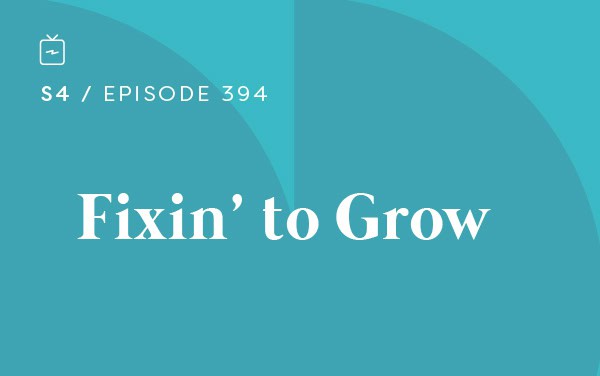
by Kris Oyen | Sep 5, 2022 | Podcast
Podcast: Play in new window | Download
Subscribe to the Recovery Elevator Podcast Apple Podcasts | | More
Episode 394 – Fixin’ to Grow
Today we have Kristie. She is 47, from Michigan, and has been sober since May 2020.
Ditch the Booze/Mindfulness and AF Photography 101: https://www.recoveryelevator.com/cafere/
Highlights from Kris
Return to school is here and is the catalyst for conversations about expectations. Growing up, the letter on the report card was the measure of success. Kris has begun to consider praising the work instead of the result.
Neuroscientists have identified two different mindsets: the fixed mindset and the growth mindset. A fixed mindset looks at intelligence as static. The effort is pointless – you’ve got it, or you don’t. It’s all about the result. The growth mindset is more about a learning goal. The effort is seen as a path to mastery.
What is your goal in recovery? Language matters. Think about the metrics. If you are fixed on being alcohol-free and have a slip, you might feel like a failure. Embrace the growth in yourself and let that be enough.
Better Help: www.betterhelp.com/elevator – 10% off your first month. #sponsored
[11:29] Kristie has been surise for two years. The word sober doesn’t resonate with Kristy. She wants to be fun and exciting and enjoy every moment. Kristie believes that language creates our reality. Through journaling, she came up with the word surise – it brings her energy, light, and love. Kristie believes surise is yours – the opportunity to be your authentic self.
Kristie is from West Michigan and is an academic advisor. She is married and has two daughters. She loves traveling, the beach, the woods, nature, and connecting with people.
Growing up, her parents rarely drank, but they did smoke. After her parents’ divorce, she assumed much responsibility for her younger brothers. She was the conduit between her parents. She was involved in theater, student government, and dancing.
Kristie went to college and was ready to rescind the role of the responsible oldest child. Earning a degree was essential to Kristie. She went to school and partied and enjoyed drinking and being social. She adopted the work hard, play hard mentality and always drank to get a buzz. She put herself into some risky situations and was raped. Alcohol helped numb the pain, and she learned to carry on.
Kristie met her husband in college, and drinking was part of their relationship. Drinking was a coping mechanism for the stress of parenting. Over the years, her drinking progressed from beer to wine to vodka. After her father died, Kristie’s drinking became very dark. Drinking was a reward, a way to avoid loneliness, and it served many purposes.
Several years ago, Kristie’s husband announced that he was planning to quit drinking. He did, and she couldn’t follow suit. After her father-in-law died, they were both drinking again and went backward. Kristie read “This Naked Mind” and listened to Annie Grace’s podcast. Paul Churchill was Annie’s guest, and something clicked for Kristie. She could hear herself in other people’s stories. She joined Café RE in 2020 and went to her first women’s AA meeting. She quit drinking for several months and returned to drinking when the pandemic began. In May of ’20, she found a small group of RE members all over the US, and they held each other accountable.
Kris’s Summary
Look at your mindset. Ask yourself without judgment, are you holding on to absolutes? What is your measure of success? Do you find joy in the results or the process? Wherever you are is okay. Show yourself grace. Change the narrative. Surrender to the process. Let go of old ideas.
Upcoming events, retreats, and courses:
- You can find more information about our events
Resources
Connect with Cafe RE – Use the promo code OPPORTUNITY to waive the set-up fee.
Recovery Elevator YouTube – Subscribe here!
Sobriety Tracker iTunes
Recovery Elevator-
We are the only ones who can do this, but we don’t have to do it alone.
I love you guys.
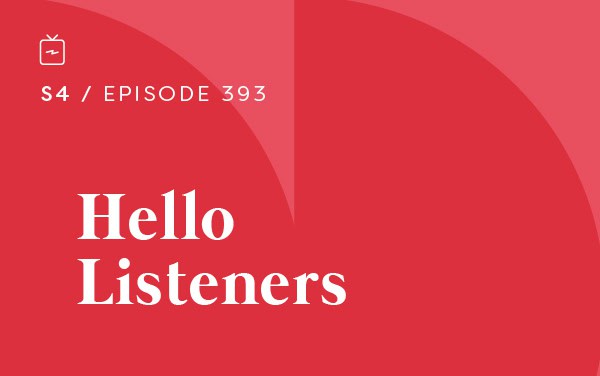
by Kris Oyen | Aug 29, 2022 | Podcast
Podcast: Play in new window | Download
Subscribe to the Recovery Elevator Podcast Apple Podcasts | | More
Episode 393 – Hello Listeners
Today we have Alina. She is 32, from Northern California, and has been sober since June 20, 2022.
Fire Brew: https://www.drinkfirebrew.com/
Ditch the Booze/Mindfulness: https://www.recoveryelevator.com/cafere/
Highlights from Paul
If you are in a cycle of continuous Day ones, keep showing up and listening to the podcast. We believe in you.
If you have quit drinking, don’t forget incredible short memory can get us any time. Don’t look back. That old way of life didn’t work. Keep building the new.
If you are a normal drinker here to support someone, we are glad you are here. The opposite of addiction is connection, and we appreciate your support. The healing process is a collaborative effort that requires both parties to come together.
If you are in your teens or twenties, you are learning vital lessons and building resilience. When the dust settles, and your normal drinker friends begin to phase out of the party years as they marry and have kids, you will have acquired unique life skills that your friends don’t have. Your unique skills revolve around presence, listening to your intuition, taking life as it comes, loving yourself and others. You’re more grounded. Your roots go deeper. Also, be patient. I think it’s harder to quit drinking at a younger age, but with time, and each year around the sun, some of those challenges get easier. Time is working in your favor.
If you treat or support someone who struggles with, what is addiction? Addictions are adaptive behaviors leveraged to survive in unhealthy environments. Addictions are present when something is out of balance or not in harmony with our environment.
Keep the thinking mind in check. The mind has 60,00-70,000 thoughts per day, and science has shown that most of them are not valid. Keep doing the inner work, find your people, and show the world how it’s done.
Better Help: www.betterhelp.com/elevator – 10% off your first month. #sponsored
[13:04] Alina has been sober for two weeks. She has three kids, loves being outside, cooking, and reading. She immigrated to the US from Ukraine, is the youngest of seven, and had her first drink at age 16. Growing up, she had the impression that an alcoholic was someone who drank every day.
In 2018, Alina had her first blackout. She resolved to do something different. She listened to “This Naked Mind” by Annie Grace. Moderation never worked. During the pandemic, Alina went on vacation to Mexico and drank daily. Alina continued to learn about recovery, and she learned to see the similarities in other people’s stories. She is an active member of Café RE and enjoys the chats.
Paul’s Summary
Listeners, stick together. Choose love over fear. Choose peace over being right. If the conditions are right, we bloom as a species. If the conditions aren’t right, we don’t. Humans are so close to blooming on a large scale, and addiction is fast-forwarding this process. Addiction forces us to surrender, open up, and say yes to the flow of life.
Upcoming events, retreats, and courses:
- You can find more information about our events
Resources
Connect with Cafe RE – Use the promo code OPPORTUNITY to waive the set-up fee.
Recovery Elevator YouTube – Subscribe here!
Sobriety Tracker iTunes
Recovery Elevator-
Lighten Up.
I love you guys.
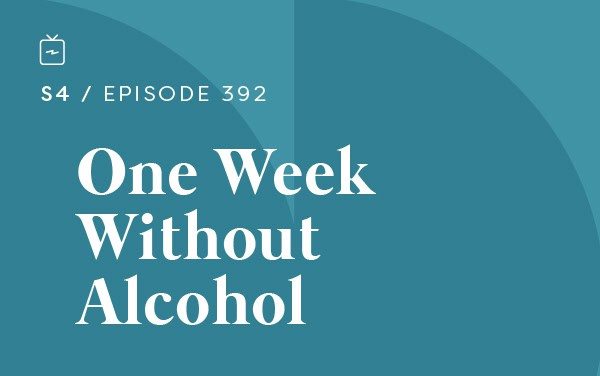
by Kris Oyen | Aug 22, 2022 | Podcast
Podcast: Play in new window | Download
Subscribe to the Recovery Elevator Podcast Apple Podcasts | | More
Episode 392 – One Week Without Alcohol.
Today we have Megan. She is 34, from Florida, and has been sober since June 22, 2021.
Gruvi: https://www.getgruvi.com/
Highlights from Paul
Stacking days, which is a day here, and a couple of days there, is fantastic, but your body and mind will respond faster to continuous sobriety, and I think a week is the most doable chunk of time. I know for me, even 30 days was overwhelming.
Day 1: Drink water, then more water. Eat at least one full, healthy meal. Your body is detoxing today. Anxiety is part of this. Embrace the process. Remember the pain. Exercise will help with sleep. Sleep won’t be great, and night sweats are expected. Expect cravings, and ice cream is your friend.
Day 2: Expect to be tired, exhausted, and anxious. Drink water, sleep, eat ice cream and worry about sugar later.
Day 3: Sleep should improve and welcome back appetite. Eat a healthy breakfast.
Day 4: Your body is healing. Drink water, sleep and eat (sugar does help with cravings.)
Day 5: What happened? You may be sleeping better, and you are hungry. Eat some healthy food and don’t worry about calories. Your brain is coming back on, which has two sides: your cognition is better, and the thinking mind is on overdrive.
Day 6: Your confidence is building, and your energy begins to return. Inflammation begins to dissipate.
Day 7: Sleep! Cellular restoration. Mental clarity improves.
Tips for week one:
Drink plenty of water
Exercise for at least 20 minutes. It gets endorphins going
Eat at least one meal with healthy greens
Put pen to paper and capture your insights
Remember, it’s a week and not forever.
Seven days is the start of the healing process. Your seven days await – go get ’em.
Paul describes PAWS (Post Acute Withdrawal Symptoms) in this video
https://www.youtube.com/watch?v=esHLnz-BUXw&t=1s
Better Help: www.betterhelp.com/elevator – 10% off your first month. #sponsored
[15:40] Megan has been sober for over a year. She lives in Orlando, has two kids, is a social worker, and is getting a master’s in criminal justice. She loves to travel and has been to 25 countries. She loves the beach, music, theater, working out, and theme parks.
Megan grew up in a conservative religious home with no alcohol in the house. Her grandfather was a recovering alcoholic. Alcohol was a big part of her family history, and Megan experienced a lot of generational trauma. Megan’s father passed away when she was 15, and her childhood abruptly ended. Coincidentally she had her first drink that year.
Megan started using alcohol as a coping mechanism in her early twenties. Her marriage, work, and being a grown-up were a lot to manage. In 2021 she started working for a men’s prison, which changed her life. Giving something back and witnessing other people’s trauma helped her harness her inner strength. Megan was able to share her story and learned to adopt solid self-care practices. Slowly, she started to heal.
Today, Megan sees sobriety as a beautiful way to live, even if incarcerated. She credits the men at the prison with helping her to get sober. Her sobriety tools include self-care, Café RE, leveraging an accountability partner, focusing on the good in life, and great friends. Instagram: magicalsobermama
Kris’s Summary
Together is always better. Kris just returned from the Bozeman retreat, and he loved getting to see all the participants.
Upcoming events, retreats, and courses:
- You can find more information about our events
Resources
Connect with Cafe RE – Use the promo code OPPORTUNITY to waive the set-up fee.
Recovery Elevator YouTube – Subscribe here!
Sobriety Tracker iTunes
Recovery Elevator-
We are the only ones who can do this, but we don’t have to do it alone.
I love you guys.







